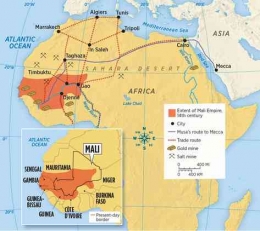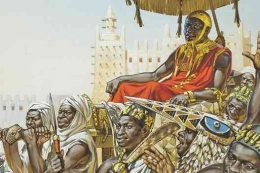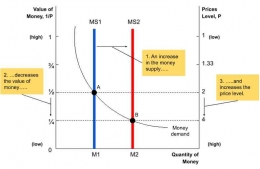1. Introduction
Background
A distinguished economist named Milton Friedman once said, "Inflation is always and everywhere a monetary phenomenon". In other words, where there is money, there is inflation. It is common knowledge that money or currency has evolved tremendously since a long time ago. From merely sea shells more than 3,000 years ago to 136 different currencies used in this modern era (Galeza & Chan, 2018). But, what about inflation? Has it started a long time ago as well? In this writing, one of the first cases of inflation in the world is analysed through a monetary lens. The case that occurred in the 14th century involved an African king called Mansa Musa, gold, and--surprisingly--an excessive behavior of generosity.
Who is Mansa Musa and his Mali Empire?
The name Mansa Musa may seem unfamiliar to the general public, but historians believe he is the wealthiest man alive. Habashi (2009) described the West African emperor's wealth as incomprehensible and is given the title king of the gold mines. There are two factors that contribute to the incredible wealth possessed by the kingdom of Mali especially during Mansa Musa's reign. The two factors, among others, are the geography-political aspect and economic system of the kingdom.
The geopolitical system of Mali Empire
Mali was a strong and wealthy kingdom with control of the territory along the Niger river valley. The kings who ruled there were Sundiata and Mansa Musa. Sundiata was a king who first conquered the kingdom of Ghana and became the founder of the kingdom of Mali. Mali reached its golden age during the time of Mansa Musa, at the time when gold was a very important resource. During Mansa Musa's reign, there was also an expansion or spread of influence that reached the center of Timbuctu (KawKaw) and Djenne (see Figure 1). These two areas were influential trade centers for West Africa as well as centers of cultural wealth and knowledge. The military system was also influential for the Kingdom of Ancient Mali for it functions as security and protection to the kingdom.
The economic system of Mali Empire
Seen from the geographical location, the ancient Mali kingdom is located around the Niger river which provides major sources of life, such as fishing, drinking water and water for agriculture. Thus, the kingdom of Mali had started to develop an irrigation system at that time. In addition to making a living as farmers, residents of the ancient kingdom of Mali also produced salt. This is because they live around the Sahara. Its territory also includes three huge gold mines (Bambuk, Bure, and Bourn) which makes Mali a supplier of gold to Europe, Middle East, and North Africa. Given the strategic location and openness to trade, many local and foreign traders pass the empire's border bringing goods for trans-saharan trade. The kingdom also benefits from this trade by levying tax and custom fees which contribute significantly as a source of income (Harris, 2020).
2. The Case of Mansa Musa Pilgrimage











